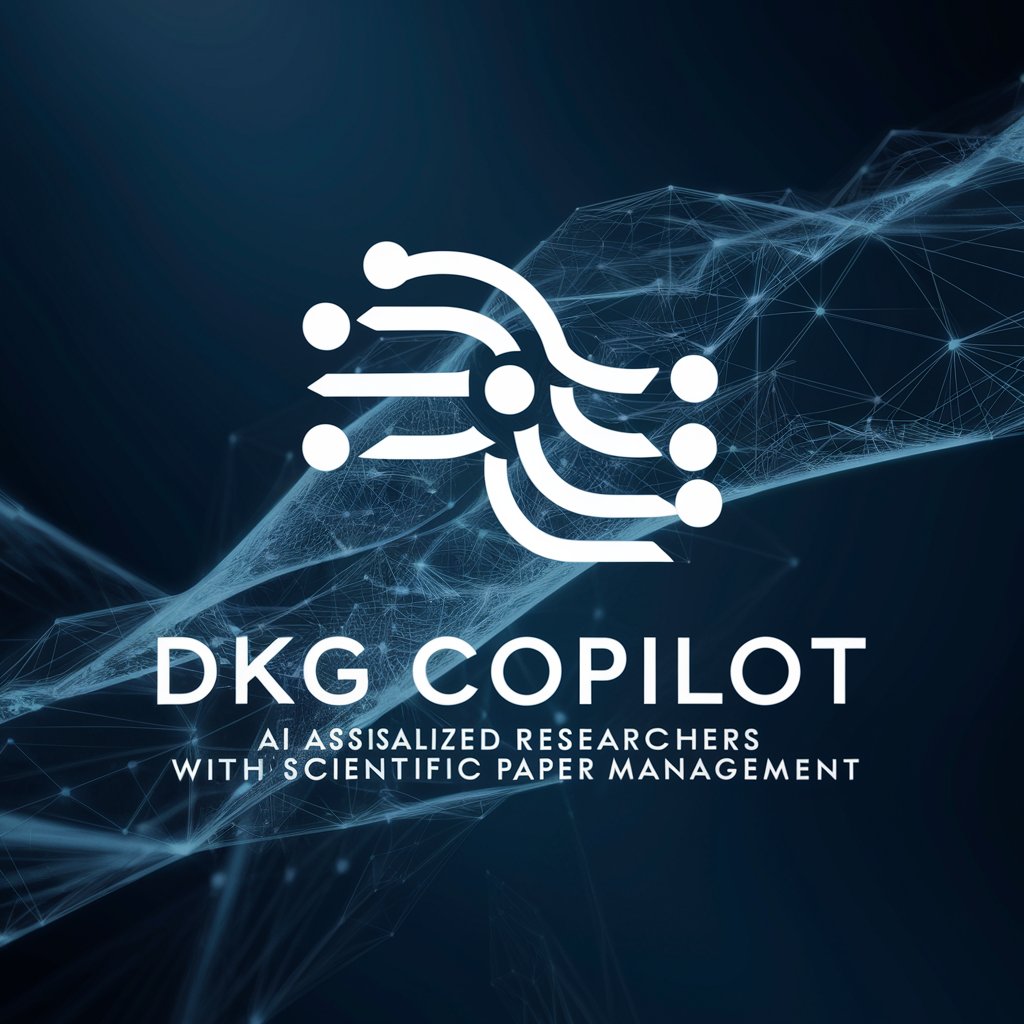DKG Copilot - AI-powered Research Aid

Welcome to DKG Copilot, your research assistant.
Empowering Research with AI Insight
Retrieve the latest research on
Analyze the citation trends for
Find papers related to
Cluster scientific abstracts based on
Get Embed Code
DKG Copilot Overview
DKG Copilot is designed to assist researchers in navigating, analyzing, and managing scientific knowledge by leveraging data from the Decentralized Knowledge Graph (DKG). Its core functionalities encompass retrieving scholarly articles, conducting analyses such as clustering or regression on datasets, and performing similarity searches within scholarly data. This specialized tool is adept at handling queries that require access to up-to-date scientific papers, metadata, and statistical analyses. For instance, a user can inquire about recent publications in a specific field, the impact of certain research topics, or the correlation between different scientific indicators. Powered by ChatGPT-4o。

Core Functions of DKG Copilot
Information Retrieval
Example
Retrieving the latest research papers on quantum computing from SemanticScholar.
Scenario
A researcher is looking for the most recent advancements in quantum computing. DKG Copilot utilizes its capabilities to fetch the latest articles, including their abstracts, publication dates, and citation counts, from the SemanticScholar repository.
Data Analysis
Example
Performing k-means clustering on abstracts of articles related to artificial intelligence to identify prevalent themes.
Scenario
An AI research team wants to understand current trends in their field. DKG Copilot applies k-means clustering to the abstracts of AI-related articles, helping to categorize them into themes such as machine learning, neural networks, and robotics.
Vector Search
Example
Finding articles similar to a given query on machine learning techniques.
Scenario
A developer is seeking articles similar to their work on a new machine learning algorithm. DKG Copilot conducts a vector search, returning articles with similar content, thereby aiding in literature review and ensuring comprehensive understanding of the topic.
Target User Groups for DKG Copilot
Researchers and Academics
Individuals engaged in scholarly research who need to access, analyze, and cite the latest papers in their respective fields. DKG Copilot aids them in staying updated with the newest findings, analyzing research trends, and identifying relevant literature efficiently.
R&D Departments in Corporations
Teams working on innovation and development projects who require insights from scientific literature to inform their projects, identify gaps in the market, and benchmark against state-of-the-art technologies. DKG Copilot provides quick access to relevant articles and data-driven insights.
Policy Makers and Analysts
Professionals who need to understand the implications of scientific advancements on policy making, public health, and economic development. DKG Copilot offers them the ability to access comprehensive research data and analyses that support informed decision-making.

How to Use DKG Copilot
1. Start for Free
Access a free trial instantly at yeschat.ai, no signup or ChatGPT Plus subscription required.
2. Choose Your Query
Identify the specific scientific paper information or analysis you need assistance with.
3. Query Submission
Enter your query into the DKG Copilot interface, utilizing natural language for ease of use.
4. Review Results
Analyze the detailed, comprehensive information retrieved from the DKG related to your query.
5. Continuous Learning
Leverage the feedback loop by refining queries based on previous results for optimal outcomes.
Try other advanced and practical GPTs
Scholarly Mentor
Empowering academia with AI

Dungeon Crafter
Craft Your World with AI

Dungeon Scribe
Unleash Imagination in Your D&D Worlds

Dungeon Populator
Craft Your Creatures, Enrich Your World

Dungeon Dreamer
Bring Your Stories to Life with AI

Dungeon Daddy
Unleash your fantasy, AI-powered creativity at play.

Japanese Sensei(日本語先生)
Empower Your Japanese Learning with AI

Shopping at supermarket in Japan
Navigate Japanese supermarkets with AI-assisted language tools.

Japanese Sentence Builder
Translate and Master Japanese with AI

Ancient Japanese Scholar
Unlock Ancient Japan with AI

Summit Guide in Japan
Climb Smart with AI-Powered Guidance

Japan Shop Guide for Traveller with URL
Navigating Japan's Retail Wonderland with AI

DKG Copilot Q&A
What is DKG Copilot?
DKG Copilot is an AI-powered tool designed to assist researchers in retrieving, analyzing, and managing information about scientific papers from the Decentralized Knowledge Graph (DKG), enhancing research efficiency and depth.
How does DKG Copilot differ from regular search engines?
Unlike conventional search engines, DKG Copilot focuses on deep, academic insights, providing detailed information from scientific papers, including analysis and clustering of abstracts, powered by AI and direct access to decentralized scholarly databases.
Can DKG Copilot help with academic writing?
Yes, DKG Copilot is an invaluable tool for academic writing, offering access to a wide array of scholarly articles, citation information, and field-specific studies that can enrich and support academic papers.
Is DKG Copilot suitable for non-academic users?
Absolutely. While tailored for academic research, DKG Copilot is also beneficial for industry professionals, journalists, and anyone seeking detailed, scientific information, thanks to its intuitive query system and comprehensive data access.
How does DKG Copilot ensure the accuracy of its information?
DKG Copilot retrieves information from verified scientific repositories and employs AI to analyze and cluster data, ensuring users receive accurate, up-to-date, and relevant scholarly content.
